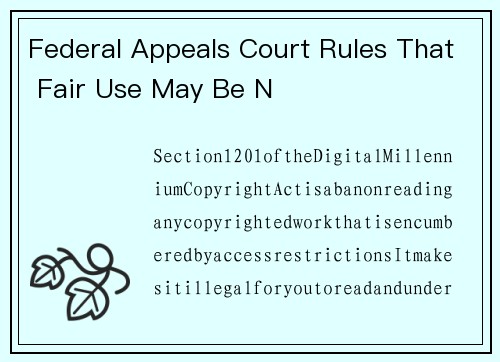Federal Appeals Court Rules That Fair Use May Be N
Section 1201 of the Digital Millennium Copyright Act is a ban on reading any copyrighted work that is encumbered by access restrictions It makes it illegal for you to read and understand the code that determines how your phone or car works and whether those devices are safe It makes it illegal to create fair use videos for expressive purposes reporting or teaching It makes it illegal for people with disabilities to convert ebooks they own into a format they can perceive EFF and cocounsel at WSGR challenged Section 1201 in court on behalf of computer science professor Matthew Green and engineer Andrew “bunnie” Huang and we asked the court to invalidate the law on First Amendment grounds

Despite this laws many burdens on expression and research the Court of Appeals for the DC Circuit concluded that these restrictions are necessary to incentivize copyright owners to publish works online and rejected our court challenge It reached this conclusion despite the evidence that many works are published without digital access restrictions (such as mp3 files sold without DRM) and the fact that people willingly pay for copyrighted works even though theyre readily available through piracy Once again copyright law has been used to squash expression in order to serve a particular business model favored by rightsholders and we are all the poorer for it
Integral to the Court’s decision was the conclusion that Section 1201’s ban on circumvention of access restrictions is a regulation of “conduct” rather than “speech” This is akin to saying that the government could regulate the reading of microfiche as “conduct” rather than “speech” because technology is necessary to do so Of course you want to be able to read the microfiche you purchased but you can only do so using the licensed microfiche reader the copyright owner sells you And if that reader doesn’t meet your needs because you’re blind or you want to excerpt the microfiche to make your own fair use materials the government can make it illegal for you to use a reader that does It’s a back door into speech regulation that favors large commercial entertainment products over everyday people using those works for their own fairuse expression or for documentary films or media literacy Even worse the law governs access to copyrighted software In the microfiche analogy this would be microfiche that’s locked inside your car or phone or other digital device that you’re never allowed to read It’s illegal to learn how technology works under this regime which is very dangerous for our digital future The Court asserts that the existing defenses to the anticircumvention law are good enough even though the Library of Congress has repeatedly admitted that they weren’t when it decided to issue exemptions to expand them
BB官网All in all the opinion represents a victory for rightsholder business models that allow them to profit by eroding the traditional rights of fair users and a victory for device manufacturers that would like to run software in your devices that you’re not allowed to understand or change Courts must reject the mistaken notion that draconian copyright regimes are helpful to “expression” as a general matter rather than just the largest copyright owners EFF will continue to fight for your rights to express yourself and to understand the technology in your life
